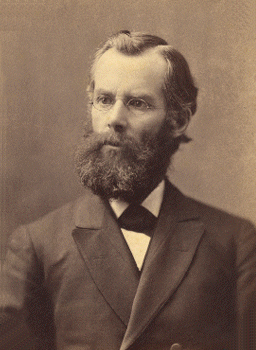|
John Nevins
Andrews
1829-1883

J. N. Andrews was born July 22, 1829,
in Poland, Maine. He quit school at the age of 11 and was largely self-taught,
apparently quite effectively. It is reported that later in life he was fluent
in seven languages and could recite the New Testament by memory. His uncle
Charles, a member of the U.S. Congress, offered to pay for his training as a
lawyer so he could follow a political career. However, early in 1845, at age
15, after reading a tract written by T. M. Preble, John accepted the Sabbath--a
decision that changed the direction of his life. He and Uriah Smith married
sisters, Angeline and Harriet Stevens.
Andrews had a long and productive
association both with the church and with James and Ellen White. His name first
appeared in Adventist literature when, in October of 1849, at age 20, he wrote
a letter to the editor of the Present Truth, James White. When the first
Adventist press was set up in Rochester, New York, in 1852, he became one
member of a publishing committee of three, at age 22. The other two members
were Joseph Bates and James White. The next year Andrews was ordained to the
Adventist ministry. By this time, 35 of his articles had been published in the
Review. In 1855, at James White's request, he wrote a paper using Bible
proofs, which settled sunset as the time for beginning the Sabbath. Ellen White
had a vision that supported his conclusions. (See Testimonies for the
Church, volume 1, page 116.)
Later that year, in poor health and
discouraged, Andrews left the ministry and settled in Waukon, Iowa. James and
Ellen White traveled there to persuade him to return, which he did. In 1858 he
led out in a study of systematic benevolence, the forerunner of the church's
tithing plan. In 1861 he published the first of several editions of History
of the Sabbath. In 1864 he was sent to Washington, D.C., in a successful
effort to secure noncombatancy status for Adventists during the Civil War. He
was elected as the third president of the General Conference in 1867, following
John Byington and James White. When the first Seventh-day Adventist camp
meeting was held in Wright, Michigan, in 1868, he showed his personal side as
he went around to the tents at the end of the day, asking: "Are you all
comfortable for the night?"
While Andrews served as editor of the
Review in 1869-70, he penned a 20-point article entitled "Our Use of the
Visions of Sr. White," in which he clearly defined the relationship between the
gifts of the Spirit and the Holy Scriptures. (See Review and Herald,
February 15, 1870.)
Ellen White sometimes sent reproofs
to Andrews, as she did in 1872 when he was delaying the publication of his next
edition of History of the Sabbath. She told him that instead of trying
to answer every objection, he should simplify his arguments. She urged him to
develop all his powers equally. She later edited her letter to him, including
it in Testimonies for the Church, volume 3, pages 32-39.
John's wife Angeline died of a stroke
in 1872. Ellen White urged him to remarry, but when he went to Europe in 1874
as the first official Seventh-day Adventist missionary, he went as a widower
with his teenage children, Charles and Mary. Ellen White wrote to church
leaders in Europe: "We sent you the ablest man in our ranks" (Manuscript
Releases, volume 5, page 436). Although he received frequent corrections
from Ellen White, Andrews wrote often in support of her ministry and her
visions. Always interested in writing and publishing, he established the
Adventist press in Basel, Switzerland.
Andrews died of tuberculosis in 1883,
at the age of 54, while in Europe. He is buried in Basel, Switzerland.
|